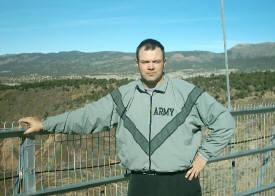Strained, Army Looks To Guard For More Relief
While this is going on there is also a proposal to eliminate consent of the governors to mobilize National Guard troops. The nation's governors are closing ranks in opposition to a proposal in Congress that would let the president take control of the National Guard in emergencies without consent of governors. The measure would remove the currently required consent of governors for the federalization of the Guard, which is shared between the individual states and the federal government. This of course only applies to disasters and civil emergencies. Militarily for defense, the President has always had the authority to federalize the guard. This is a double edged sword. On the one hand it provides a centrally managed front to manage disasters (would have helped with Katrina) and relieves the states of tons of financial burden. On the other hand, federalizing the Guard would prevent them from performing in a law enforcement capacity. The Posse Comitatus Act (18 U.S.C 1385) passed in 1878. This proposal is a direct result of Governor Blanco never officially requesting federal help, so what we have now is each side shaking their perspective fingers at each other. This of course solves nothing. The real problem with this proposal is that the president decides what constitutes a crisis, as seen by some of his recent comments about what he feels he has the authority to do this will only result in the guard being used and abused. So the result is people can’t go home but the contractors keep getting richer…ahh the American dream
By Thom Shanker and Michael R. Gordon
WASHINGTON, Sept. 21 —
Strains on the Army from the wars in Iraq and Afghanistan have become so severe that Army officials say they may be forced to make greater use of the National Guard to provide enough troops for overseas deployments.
Senior Army officers have discussed that analysis — and described the possible need to use more members of the National Guard — with Defense Secretary Donald H. Rumsfeld’s senior adviser on personnel, David S. C. Chu, according to Pentagon officials.
While no decision has been made to mobilize more Guard forces, and may not need to be before midterm elections, the prospect presents the Bush administration with a politically vexing problem: how, without expanding the Army, to balance the pressing need for troops in the field against promises to limit overseas deployments for the Guard.
The National Guard has a goal of allowing five years at home between foreign deployments so as not to disrupt the family life and careers of its citizen soldiers. But instead it has been sending units every three to four years, according to Guard officials.





No comments:
Post a Comment